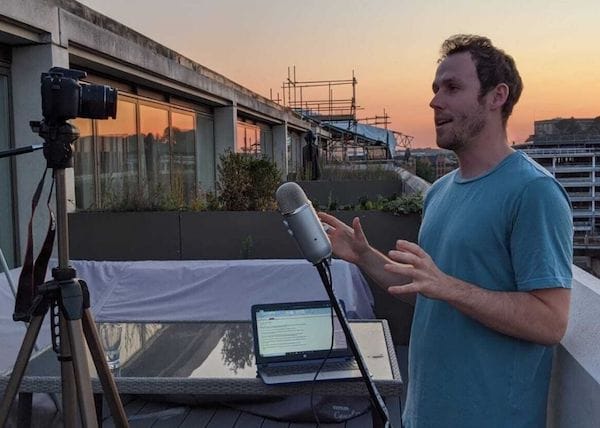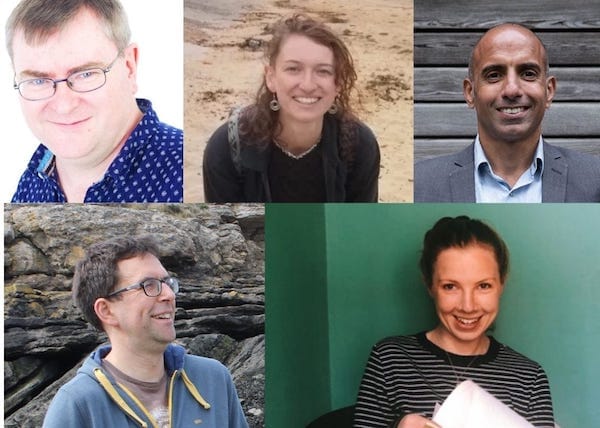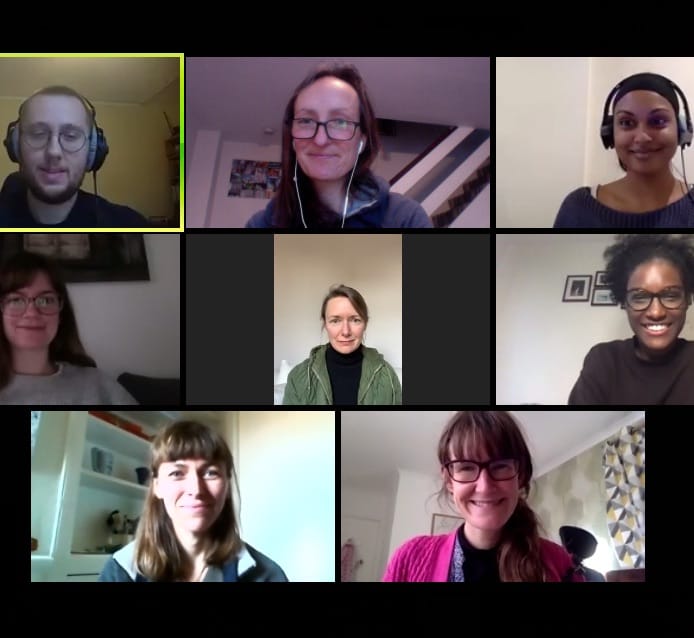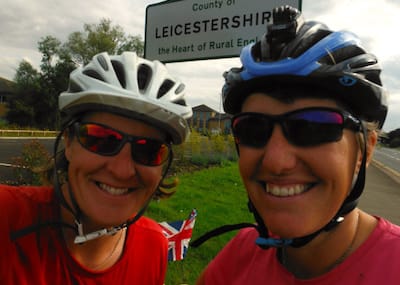This podcast is episode 11 of our #FlightFree2020 series. You can listen to the podcast, and access the rest of the series, at our podcast page.
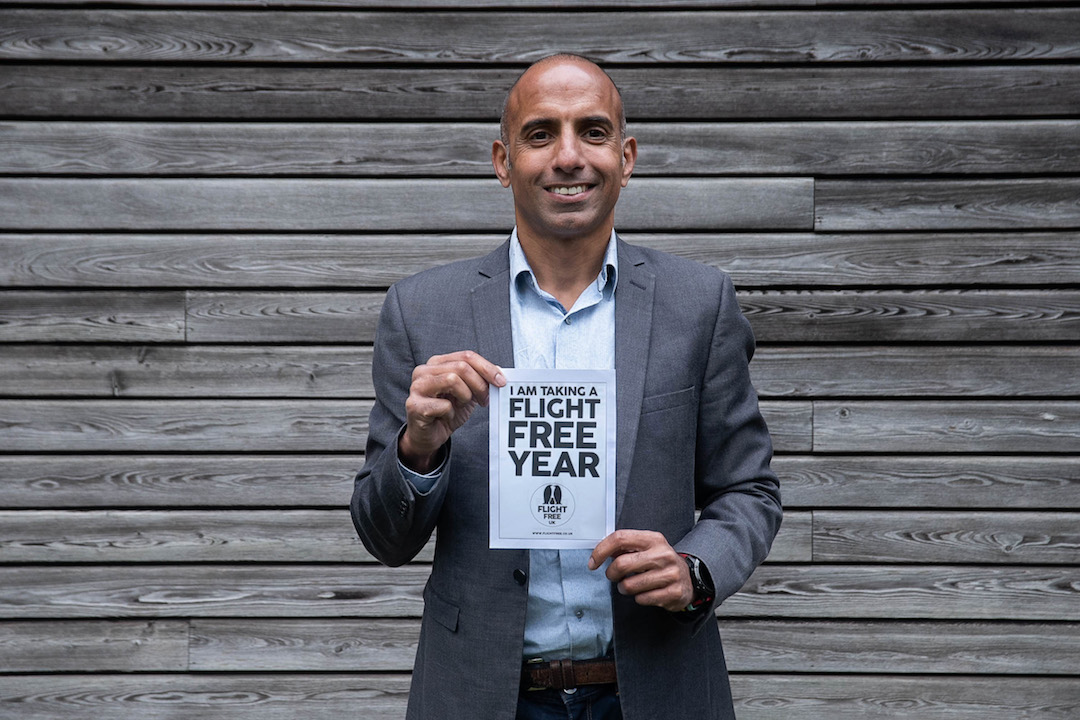
A lot of the time when we talk to people about flying, they point to the stereotype of businessmen taking flights every week being the problem. But business flights only make up 10% of international flights from the UK, and that number has been fairly steady for the past ten years or so. That number has plummeted during Covid, but while we can expect flight numbers to rise again for holidays or visiting friends and family once the pandemic is over, it might be the case that the business world realises it can conduct the majority of its business online, as we have all been doing this year.
This might complicate things for airlines, because selling high-cost business-class seats means that they can offer cheaper seats elsewhere, so it's a key part of their business model to keep the business world in the air. But there are many within the business world who think businesses rely on travel way too much, and Gope Walker is one of them.
Gope is the CEO of an IT consultancy called Data Kraken, which was set up 6 years ago and now has clients and staff across 3 continents. But despite the international nature of Gope’s business, he has taken the flight free pledge, and in fact has decided that his whole business will be flight free in 2021. We asked Gope, what inspired him to get involved in the flight free campaign.
Gope:
I've always been passionate about the environment and always wanted to live green lifestyle. But I wasn’t aware of impact of flying on environment until recently. I saw Anna Hughes on BBC Breakfast and was shocked by the stats of the impact of flying. So I did some research and it opened my eyes – I couldn’t go back to my old ways.
In the way Anna has inspired me to not fly, me not flying will hopefully inspire other people who know me, or whose lifestyle resonates with mine – or maybe encourage them to just think about it.
"Me not flying will hopefully inspire other people who know me, or whose lifestyle resonates with mine."
Do I miss some of the things that flying allows me to do? Yes. Do I understand that there are people and places that I’m never going to see? Yes. But am I happy to sacrifice these things if it means that I am part of the solution rather than part of the problem? Yes!
Flight Free UK:
Gope has embraced the whole flight free challenge from a personal point of view. So what about the business point of view? What measures does Data Kraken have in place to reduce staff travel?
Gope:
We’ve always had processes in place to minimise unnecessary travel. Covid has really highlighted that many businesses are reliant on unnecessary travel. So actually the pledge hasn’t impacted upon our relationship with our clients because we already had strategies in place for that, e.g. the solution for our clients in South America includes a minimal amount of travel. If we hadn’t done that we would have lost a lot of time & money, and staff would have been away from family and friends unnecessarily.
"Covid has really highlighted that many businesses are reliant on unnecessary travel."
I’m no saint – in 2005, I flew London-Dublin every week for 6 months, flying out on Monday, coming back on Thursday. The impact of flying isn’t just environmental. From a business point of view I was unproductive from when I left home in Berkshire until I got to the client in central Dublin – about 5 hours. Cost-wise, flying, petrol, parking, and taxis is not cheap. And I put on 10kgs because of living out of a suitcase and eating unhealthy.
I cannot tell you how bad airports are. They are horrific places! You can’t get healthy, there’s not much natural light, the chairs are uncomfy, you can’t work there, they are horrible. Above all other things, this put a lot of stress on relationship with my then-partner. I want to make sure my team don’t go through any of those things.
Flight Free UK:
While Flight Free UK is a climate change organisation, the benefits in stopping flying are not just about reducing emissions. Travelling without flying is a much less stressful and much more enriching way of travelling, and from a business point of view, train travel for example is much more productive than sitting on a plane – or you can simply cut out that travel full stop. So while many people might not have the environment as their top priority, it’s important to talk about the financial benefits, and the efficiency benefits of travelling and flying less.
Gope:
Flying and travelling to the airport and being at airports is dead time. You cannot run a business if you are constantly in and out of airports – it's tiring, there isn’t an environment to work, it’s difficult to collaborate, when you’re on flights the wifi’s not there, and there isn't the facility for enough business people to be able to work efficiently in an airport.
I’ve done it a lot – I’ve flown business class, I’ve flown first class, and it is not as productive as being at your own desk or taking the train where you’ve got a big table where you can stretch your legs and you’ve got internet access. Economically, flying is my least favourite option for myself and my staff to travel.
"Economically, flying is my least favourite option for myself and my staff to travel."
Flight Free UK:
We’ve seen a massive boom in online interactions this year as we’ve all embraced the digital world to stay connected with our loved ones and to keep our businesses going. Being forced to move online has really kick-started improvements in those online platforms, and many of us have embraced the use of technology as an asset. Gope explains which measures they’ve taken at Data Kraken to enable good online meetings.
Gope:
Firstly, HD camera. All of our staff laptops have HD cameras for talking with clients. It makes a big difference. We have digital whiteboards to help with collaboration. And a good microphone.
There’s a massive elephant in the room when it comes to collaboration and business meetings, and it’s bad project management and bad documentation. I’ve had so many business meetings when I’ve flown in to a meeting where there’s more than 5 or 10 people. You should not need to have all the people in a physical room to get information to run a business sufficiently. If you're a good project manager you should understand all the different aspects of your project then disseminate the information to each individual person. I don’t need to sit in a meeting of 30 different people and fly to get there to hear about 2% relevant to my project.
We talk about not flying, but I would challenge businesses to go further and say, do I actually need to travel? If you need to travel a lot as a business, or as a person, I think that’s an indictment of your business. That might sound controversial! But I’d challenge someone to say why I’m wrong in that.
"We talk about not flying, but I would challenge businesses to go further and say, do I actually need to travel?"
Doodle did a poll last year and they reckon £50bn was lost due to badly organised meetings. Every one of the people listening to this, if they don’t say that 30-50% of that meeting was pointless on their behalf, I would say they were lying. Because I’ve spent so many years of my life in absolutely pointless meetings and it all boils down to the fact that there’s bad project management and bad documentation. Covid has meant that businesses are having to adapt and collaborate digitally and that requires them to work more efficiently. Which for years, I don't think they have.
Flight Free UK:
Another stat says that around half of all flights taken are viewed as unnecessary by the people taking them. That applies to the business world as well as the leisure world. So there are certainly some reductions we can make when it comes to flights and travel.
However, in all of this, we can’t forget the human element. In certain circumstances, meeting face to face is something that can’t be replicated by other means. Having that connection in the flesh really does enhance your understanding of the other person and can make your working relationship much easier. You can’t always replace that with an on-screen meeting.
According to Gope there are four ways in which the business world uses flights:
- flying for a meeting
- flying for client entertaining/networking
- flying for conferences
- flying for training/teaching
The meetings and training can be done without travel, or with minimal travel. Networking and conferences are not essential for businesses but are very difficult to do without face-to-face conversations.
So perhaps, if we replace the majority of travel with interactions by other means, then we can keep those occasional in-person meetings for when they’re really needed.
Gope:
We do need to meet people and we do need to collaborate. From a business point of view networking is massive. I don't think digital networking is anywhere near as efficient as meeting face to face. My business wouldn’t have been as successful unless I’d met people face to face, taken them to the pub etc. The network element benefits lots of different people and that can’t really be replicated. But if that was done once or twice a year, that’s understandable. Training and collaboration can be done online. Some areas of travel are crucial and networking is one.
Flight Free UK:
There's a perception that if you travel a lot as a businessman, that is a measure of your success. Perhaps now is the time to burst that bubble, not just for the sake of the climate and emissions, but for the sake of people, too.
Gope:
Ultimately most of the people I’ve met across the world are exactly the same as us. Work life balance is important. They want to spend time with their family. People want to be with the people they love and do things with the people they love. Wherever I have lived, everyone’s the same.
There’s the human element. Lots of people don’t actually want to fly. Businesses have made it a necessity. Airlines have made it glamorous which I don’t think it is. If businesses talk to their staff about if they want to travel they’ll be told no, and that they want to embrace more digital culture.
"There’s the human element. Lots of people don’t actually want to fly. Businesses have made it a necessity."
Flight Free UK:
Thank you Gope for that really good insight into the business world. Thanks for listening and see you next time!
You can listen to this full podcast, and access the rest of the series, at our podcast page.
Credits: interview conducted and recorded by Anna Hughes. Intro voiceover: L. Sophie Helbig. Sound effects: Josh Hill.
